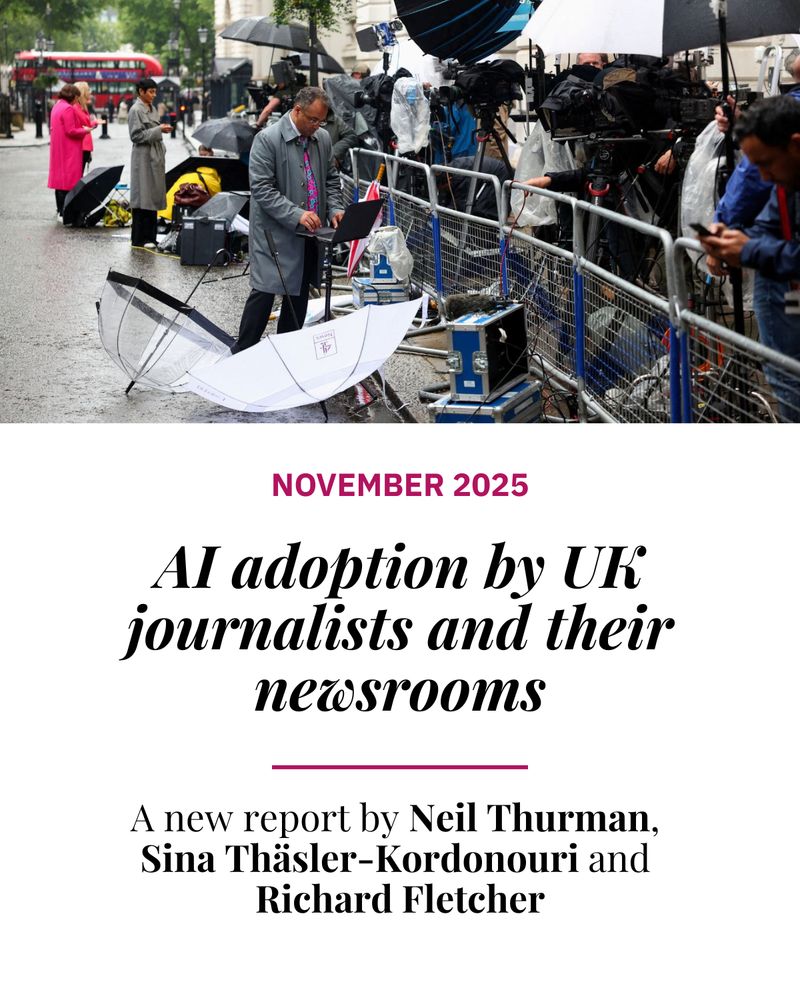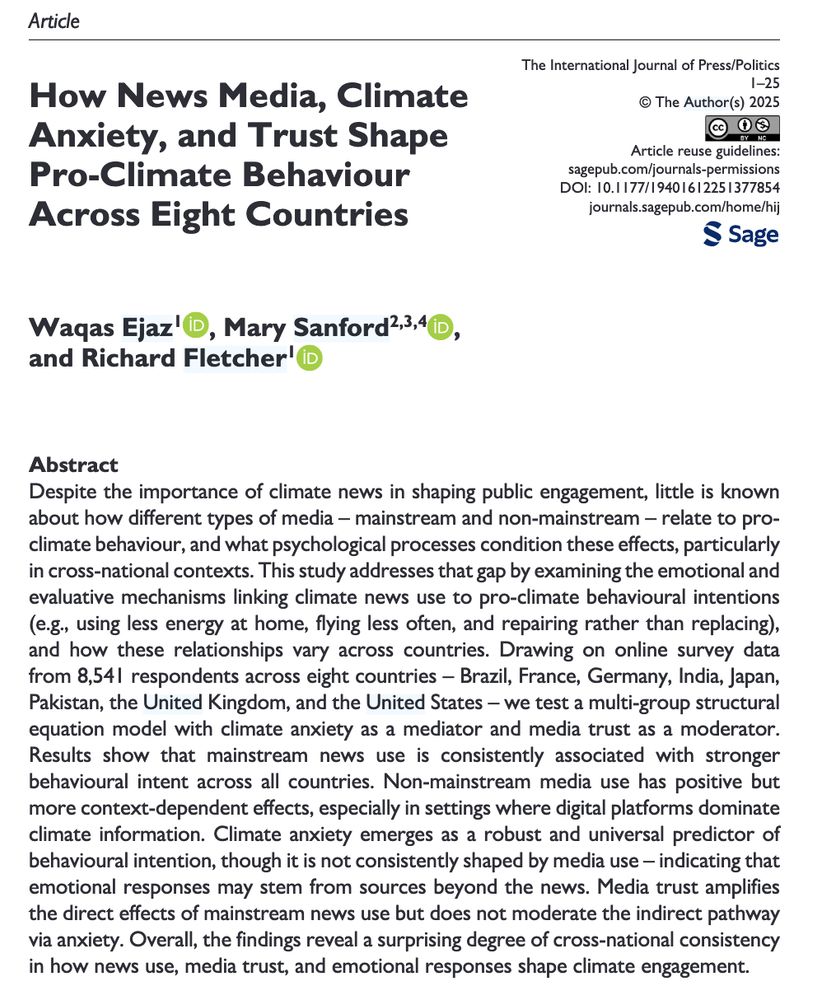
Director of Research + Deputy Director of the Reuters Institute for the Study of Journalism, University of Oxford. Fellow of Green Templeton College. Lead researcher of the Digital News Report. www.richardfletcher.me
Reposted by Richard Fletcher

Our new IPPR report answers those questions.
Read here: www.ippr.org/articles/ais...
Reposted by Richard Fletcher, Andrew K Przybylski


reutersinstitute.politics.ox.ac.uk/digital-news...
Reposted by Richard Fletcher, Linards Udris

Full report
buff.ly/Dh2JIuT
7 findings in thread
Reposted by Richard Fletcher

That is the key finding in new paper led by @antoniskalog.bsky.social analyzing social inequalities in offline and online news use across 6 countries over 10 years www.tandfonline.com/doi/full/10....
Reposted by Richard Fletcher

Reposted by Richard Fletcher

Reposted by Richard Fletcher, Brian Keegan, Roman Senninger

Reposted by Richard Fletcher, Andreas Jungherr

Reposted by Richard Fletcher


A new joint study from the Oxford Internet Institute and AI Security Institute (AISI) offers unprecedented insights into how conversational AI can exert influence over people’s political beliefs.
Read more: www.oii.ox.ac.uk/news-events/...
Reposted by Richard Fletcher

Last year we found a y-o-y decline in climate news use only in 🇺🇸. Worryingly, it’s now spread to 5/8 countries.
What’s going on? A thread 🧵
Reposted by Richard Fletcher

It is stable in Brazil, India, and Pakistan. Declines in climate news use are driven by two overlapping trends: reduced climate news access via TV, and reduced use by people over 45.
Reposted by Richard Fletcher

💻 Report: reutersinstitute.politics.ox.ac.uk/climate-chan...
🧵 Some key findings below.
Reposted by Richard Fletcher

Authored by @neilthurman.bsky.social @sinatk.bsky.social & @richardfletcher.bsky.social, it's based on a survey conducted in 2024
Read in full
reutersinstitute.politics.ox.ac.uk/ai-adoption-...
10 findings in thread

Most journalists are now using AI in their work, but they’re pretty pessimistic about what it means for journalism.
Details in the post below.
Reposted by Richard Fletcher, Neil Thurman

Authored by @neilthurman.bsky.social @sinatk.bsky.social & @richardfletcher.bsky.social, it's based on a survey conducted in 2024
Read in full
reutersinstitute.politics.ox.ac.uk/ai-adoption-...
10 findings in thread
Reposted by Richard Fletcher

Reposted by Richard Fletcher, Charlie Beckett

Reposted by Richard Fletcher

@rasmuskleis.bsky.social chaired a commission tasked by the Danish gov to design a system of direct media subsidies. In this piece he explains how they conceived their proposal and what other countries could learn from it
reutersinstitute.politics.ox.ac.uk/news/taxes-n...
Reposted by Richard Fletcher, Anne Schulz

Here's an updated version of a piece by @rasmuskleis.bsky.social @annisch.bsky.social @richardfletcher.bsky.social and Craig T. Robertson originally published in 2020
📱 Full piece here buff.ly/iLaMzHa
🧵 4 findings in thread
Reposted by Will Jennings, Richard Fletcher, Alessandro Nai

There is a growing concern that the negative valence in climate stories paralyses consumers & perhaps even prevents them from taking pro-environmental actions.
However, we found that climate anxiety is a robust and universal driver of pro-climate behavioral intentions.👇
Reposted by Richard Fletcher, Alberto Acerbi, Dean Eckles , and 1 more Richard Fletcher, Alberto Acerbi, Dean Eckles, Anne Schulz

@annisch.bsky.social et al decided to have a look. Their results? "We found that appreciation for abundance was about twice as common as overload".
Paper: journalqd.org/article/view...
Reposted by Richard Fletcher

Here's a summary by our own Gretel Kahn, which includes four takeaways and many insights from our speakers Emilio Doménech, Akash Banerjee and Mosheh Oinounou
reutersinstitute.politics.ox.ac.uk/news/summary...
Reposted by Will Jennings, Richard Fletcher, Erika Franklin Fowler

@hanaatameez.bsky.social wrote up a fascinating @reutersinstitute.bsky.social report www.niemanlab.org/2025/10/news...
📱Report buff.ly/bL6y8Hj
🧵6 findings in thread

It contains:
- 5 key findings (see link)
- Top 15 most mentioned news influencers and creators by survey respondents in 24 countries
- A typology of different content types (and examples of individuals that primarily produce each)

📱Report buff.ly/bL6y8Hj
🧵6 findings in thread
Reposted by Richard Fletcher, Stephen Cushion

➡️rich data from 3rd wave of WJS study
➡️ survey of more than 32,350 journalists across 75 countries
➡️ perspectives from diverse media systems, political regimes, and cultural contexts
Free download
www.worldsofjournalism.org/reports-wjs3/
Reposted by Richard Fletcher


